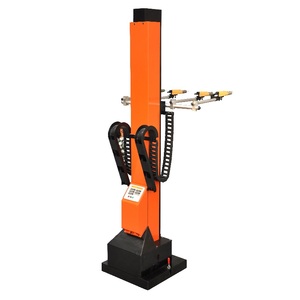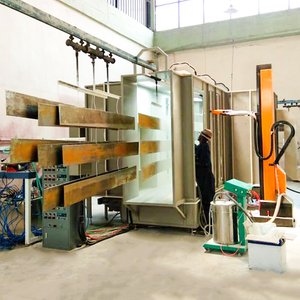
All categories
Featured selections
Trade Assurance
Buyer Central
Help Center
Get the app
Become a supplier

(1212 products available)







automated coating applicator play a crucial role in the realm of industrial machinery, specifically within the packaging sector. These machines are designed to apply a protective or decorative coating to products, enhancing their durability and aesthetic appeal. With advancements in technology, automated coating applicator have become more sophisticated, offering precise and efficient solutions for various industries. They are an integral component in sectors such as automotive, electronics, and consumer goods, where the quality of the finish is paramount. The versatility of automated coating applicator allows them to handle different materials and coatings, making them indispensable in modern manufacturing processes.
There is a diverse range of automated coating applicator available, each catering to specific applications and industries. Common types include roll coating machines, spray coating machines, and curtain coating machines. Roll coating machines are ideal for applying uniform coatings to flat surfaces and are widely used in the production of panels and sheets. Spray coating machines offer flexibility in applying coatings to complex shapes and are often employed in the automotive and aerospace industries. Curtain coating machines are known for their ability to apply thick, consistent coatings and are typically used in the production of furniture and flooring. Each type of automated coating applicator is engineered to deliver optimal performance, ensuring high-quality results for its intended use.
automated coating applicator are equipped with various functions and features that enhance their efficiency and precision. They provide a controlled environment for applying coatings, ensuring uniformity and reducing waste. Features such as adjustable coating thickness, automated controls, and temperature regulation contribute to their effectiveness. Automated controls allow for precise adjustments, minimizing human error and increasing productivity. Temperature regulation ensures that the coating material is applied under optimal conditions, enhancing its adhesion and durability. Advanced automated coating applicator also incorporate safety features, such as enclosed systems and ventilation, to protect operators and maintain a safe working environment. These functionalities make automated coating applicator a valuable asset in the production line.
The materials used in automated coating applicator are critical to their performance and longevity. Typically, these machines are constructed from high-grade metals and alloys, such as stainless steel and aluminum, which offer durability and resistance to corrosion. The choice of materials impacts the machine's ability to withstand harsh operating conditions and maintain precision over time. Additionally, components such as rollers, nozzles, and pumps are made from materials that ensure smooth and consistent application of coatings. The selection of appropriate materials is essential for achieving the desired coating quality and extending the lifespan of automated coating applicator. Manufacturers also focus on using materials that facilitate easy maintenance and cleaning, ensuring the machine's efficiency is sustained over prolonged use.
To maximize the benefits of automated coating applicator, it is important to understand their operational requirements and limitations. Proper setup and calibration are crucial for achieving the desired coating results. Users should ensure that the machine is calibrated according to the specific characteristics of the coating material and the substrate. Regular maintenance, such as cleaning and inspection of components, is essential to prevent downtime and maintain optimal performance. It is also vital to train operators on the correct use of automated coating applicator to minimize errors and enhance productivity. By adhering to these practices, users can ensure that automated coating applicator deliver consistent, high-quality coatings, contributing to the overall efficiency and effectiveness of the production process.
Choosing the appropriate automated coating applicator requires a thorough understanding of your specific requirements and the characteristics of the materials you work with. Different industries may have varying demands, such as the type of coating, the substrate material, and the desired finish quality. It's important to evaluate the machine's capacity, its compatibility with various coating types, and the precision it offers. The adaptability of automated coating applicator to different production scales can also be a deciding factor. By aligning these factors with your operational goals, you can ensure that the selected machine meets your expectations and enhances your manufacturing process.
Another essential consideration is the technological features offered by automated coating applicator. Advanced machines come equipped with automated controls, monitoring systems, and energy-efficient designs. These features contribute to improved productivity, reduced operational costs, and enhanced product quality. The ability to integrate with existing production lines and software systems is also crucial for seamless operations. Evaluating the technological capabilities of automated coating applicator can help you determine its potential to streamline processes and accommodate future advancements, ensuring long-term benefits for your manufacturing strategy.
The efficiency of automated coating applicator is largely influenced by factors such as speed, precision, and adaptability. Machines that offer faster application rates without compromising on quality are typically more efficient. Precision in applying coatings is crucial to ensure uniformity and reduce material waste. Additionally, machines that can adapt to different types of coatings and substrates provide greater flexibility and efficiency in production setups.
Ensuring compatibility of automated coating applicator with various coating materials involves understanding the machine's specifications and the properties of the coatings. Machines should be capable of handling the viscosity, curing requirements, and adhesion characteristics of different materials. Consulting with manufacturers and conducting trials can help verify compatibility and optimize settings for specific applications.
Regular maintenance is key to prolonging the lifespan and performance of automated coating applicator. This includes routine cleaning, inspection of components like nozzles and rollers, and timely replacement of worn parts. Calibration checks and software updates are also essential to maintain precision and efficiency. Proper maintenance ensures that machines operate smoothly, minimizing downtime and maximizing productivity.
Yes, customization of automated coating applicator for specific industrial applications is possible. Manufacturers offer options for tailoring machine features such as size, capacity, and technological integrations to suit unique production requirements. Customization may also include adjustments for specific coating processes or environmental conditions, ensuring optimal performance in specialized settings.
Safety is a critical aspect of operating automated coating applicator. Machines should be equipped with safety features such as enclosed systems, emergency stop functions, and ventilation to minimize exposure to hazardous materials. Operators should be trained in safe handling practices and emergency procedures. Regular safety audits and compliance with industry standards help maintain a secure working environment.